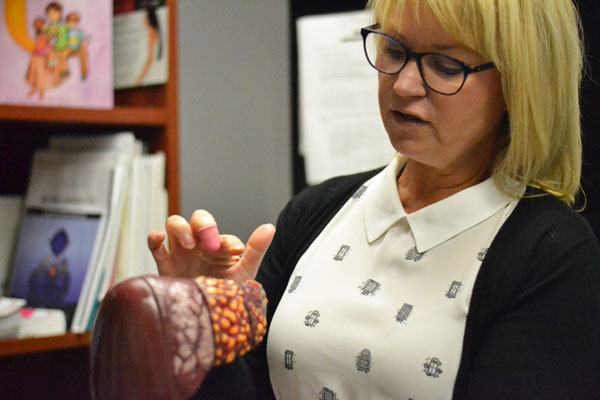
World Hepatitis Day campaign called ‘Find the missing millions’ encourages you to get tested for an often undiagnosed virus
Hepatitis C Nurse Clinician Shelley Crawford hopes awareness of the viral infection can defeat its stigma and encourage people to take action before it get worse.
Crawford, who works at Access Place in Prince Albert, spoke about the infection leading up to World Hepatitis Day on Sunday.
Hepatitis C is spread through blood to blood contact.
This can happen by re-using drug or one-use medical equipment, such as needles, and piercing or tattooing tools, getting a blood transfusion when the blood was not tested for the virus, having sex without a condom or borrowing personal care items like razors.
Crawford said of the 250,000 estimated Canadians living with Hepatitis C, about 40 per cent are unaware of it and are left untreated. The virus eventually damages the liver and leads to liver cancer.
But Crawford said there are solutions: “This is something that is curable.”
This year’s theme for World Hepatitis Day is ‘Find the Missing Millions,’ referring to those who are unknowingly living with Hepatitis C.
“In Canada, we’re dealing with twin epidemics,” said Crawford.
The first group of people she’s focusing on to get tested are those born between 1945 and 1975. This is because the virus wasn’t identified until 1989 and treatments weren’t available until years later.
The other population at high risk of Hepatitis C is young people who have a history of IV drug use.
Crawford said many are scared to come forward to a doctor after IV drug use or unsafe tattooing practices, for example.
“They are fearful of what healthcare professionals are going to think of them or label them as,” she said. “We just want everybody to feel comfortable.”
However, receiving an oral treatment after telling a doctor usually comes with a 95 per cent cure rate in as little as eight weeks.
Regardless of whether or not you fall under any of the risk factors, Crawford encourages you to take the one-time test anyway.
“Instead of trying to figure out ‘Oh, am I at risk or am I not?’ we’re just trying to encourage everyone to just ask for the test, know what your diagnosis is, know that it’s easily treatable and curable,” she said. “If liver cancer is identified early, it can certainly have positive outcomes.”
“That one-time test can save lives.”

